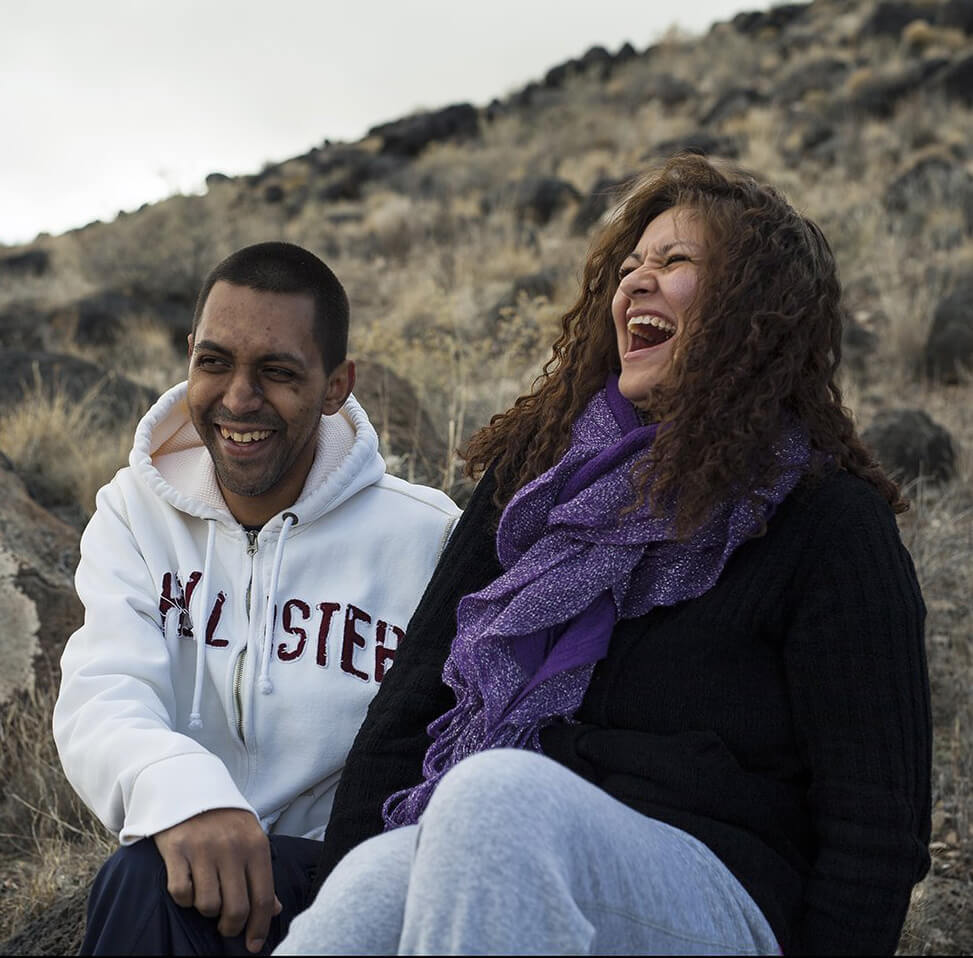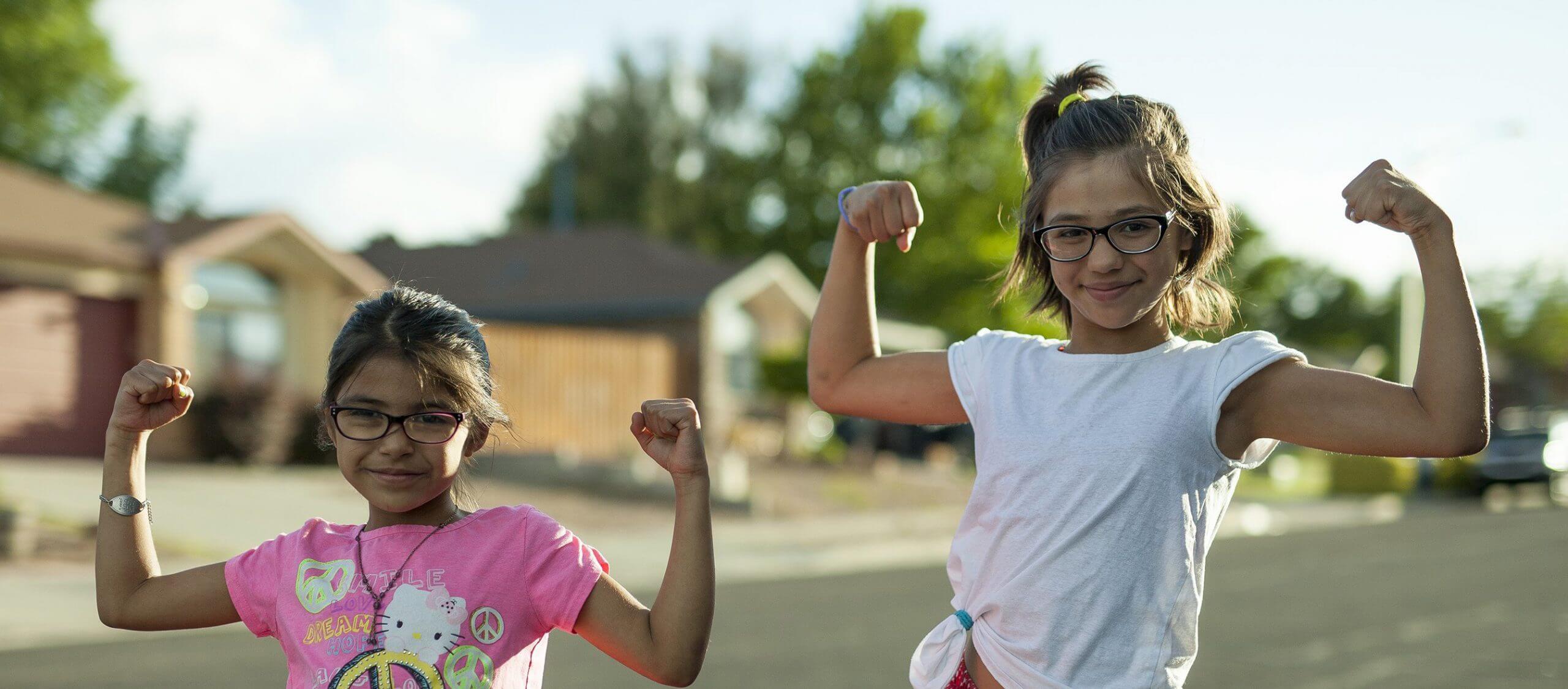The Piñon family braves the cold during an afternoon stroll through the foothills of Albuquerque, New Mexico on a blustery winter day. Bundled in scarves and sweatpants, they carefully ascend through the rocky chaparral. In the distance lies the snow-covered peaks of the Sandia Mountains, overlooking the valley they call home.
“Take my hand,” yells Stephanie. She motions toward her husband, Israel, who casually grabs her outstretched fingers. “Now don’t let me fall,” she says, and leans back with all her weight. At first she pulls him forward, but much to her surprise Israel’s strength prevails, and she’s catapulted into his embrace. Israel wraps his arms around her in a playful hug. Their son, Israel Jr., 12 years old, tugs his mother’s arm, wanting to be a part of the bonding, too. He comes crashing into his parents, who stagger from side to side trying to maintain balance. Their laughter comes out in spurts as they try to stay on their feet.
Stephanie and Israel’s jovial accents in life exhibit their incredible vigor as parents who support their family against seemingly insurmountable odds. “We are a family living under severe circumstances,” says Stephanie. “But we’re living life the best way we can.” She finds respite in her husband’s lighthearted demeanor. “He is this very funny person,” says Stephanie. “He will find a way to make you laugh no matter what. I need that sometimes.” Israel’s fluid sense of humor, and nonchalant attitude is as refreshing as the chilly mountain breezes of northern New Mexico. “Humor is my middle name,” says Israel. “It keeps me and my family grounded and centered.” Israel is a hemophiliac, affected by Severe Hemophilia A. His story, as well as his family’s, is awe-inspiring in both its beauty and tragedy, so adding a little comedy to the mix, is not just fun, but necessary.
“I was born with it,” states Israel about Hemophilia A. He rests his arms across his chest and leans back on the couch, adjusting the glasses that his seven-year-old daughter, Kristen just knocked off his face. “My dad and mom didn’t know I had it until I was about a year old. Around that time, I was learning to walk. I would fall frequently and get bruising on my thighs. My mother took me to doctors, but they had a hard time figuring it out. Finally, I went to a really good doctor who diagnosed me with Hemophilia.”
— Israel“My dad and mom didn’t know I had it until I was about a year old.”
Israel’s Hemophilia was difficult to manage when he was young as he had frequent bleeds that necessitated medical attention. “One time I bit my tongue. I almost died from that,” he recalls. “I came pretty close to dying about two other times where they just couldn’t control the bleeding.”
Still, his mother wasn’t overly restrictive. “The only thing I wouldn’t participate in was sports… I focused more on school and studies. I grew up as a normal kid, riding bikes and hanging out in the neighborhood.” His Hemophilia was also complicated by living in a small town, in rural New Mexico. “It was 30 minutes to get to a hospital,” he remembers. “My mom would drive me to the ER every time I got a bleed, sometimes at 2:00 in the morning.” His insurance would only cover visits to the hospital and medication after a bleed, meaning long, stressful hours in the ER awaiting clotting factor were routine. His limited access to this necessary medication continues to affect him. “As a result of not having factor when I needed it, I have damaged joints today. I wasn’t able to infuse prophylactically like I can now.”
Israel also grew up at a time when factor transfusions—the only widely available treatment for Hemophilia—were entirely derived from donated blood. Negligent mismanagement of the industry led to the use of contaminated blood in these transfusions, and created a crisis in the hemophiliac community. During the 1980s, they became one of the most high-risk groups for contracting blood-borne pathogens amidst the rising AIDS epidemic. “A lot of hemophiliacs got infections back then,” recalls Israel. “I was fortunate not to get AIDS or hepatitis.”
As a young man, Israel worked many jobs and studied hard in school. It was in high school when he first met Stephanie. “We had English together. That’s when it all started,” Stephanie reminisces. The two became friends and Israel would walk her to class regularly. “He could be annoying, but at the same time, he was just really fun to be around. He was an awesome friend and always has been.” Stephanie moved away to pursue a pop music career, but found herself back in New Mexico years later. Soon enough, and through a modicum of pursuit, Stephanie reintroduced herself to Israel. “He knew me right away. He remembered me,” she recalls. “I asked him to be my boyfriend. We’ve been married now for almost 15 years.”
“Stephanie is a tremendous support emotionally, mentally, physically, and spiritually,” says Israel. Their mutual fondness is built on trust and a willingness to take care of each other that supersedes the obstacles they face on a daily basis. Through self-education, Stephanie has mastered crucial elements of caretaking and helps out regularly with Israel’s injections. “When I need her she doesn’t second guess herself or wonder how she can help me. She just takes a deep breath and does whatever is needed and knows she will get it done.”

Their touching friendship and love has remained a cornerstone that would only solidify as they decided to start a family, which unbeknownst to them, came laden with complications. Israel and Stephanie have lost two children, and have three more who are each medically affected.
Matthew, their first child, was born with multicystic renal dysplasia and didn’t survive his first day. “There’s no such thing as being prepared to say goodbye to someone that didn’t get a chance to start living,” says Stephanie. Years later, their eldest daughter, Jahzel, died at the age of two in a vehicular accident. These traumatic events challenged Israel and Stephanie to the very core of their existence. “It didn’t feel like we could make it. It affected us so bad,” says Stephanie, reflecting on their toughest moments of loss. Through their love for each other and support from their church congregation however, they found the resolve to continue. “Our faith really helped us move forward and reminds us that through advocacy, family, and community we can get through anything.” Strong faith guides the Piñon family today, and continues to instill valuable lessons and fierce resolve. “Our faith helps us to see hope,” says Stephanie. “That hope keeps our marriage very strong and keeps our kids grounded.”
Their second son, Israel Jr., also knows what it’s like to have to fight for his life. “We call him our warrior. There’s no way I could have endured what he has,” says Stephanie. “He fights back. He’s not ready to go anywhere. He wants to stay here on earth.” Israel Jr. was born with biliary atresia, and needed a liver transplant to survive. It was difficult to find a good match, and not until the last possible moment, did the family find a donor. Israel Jr. courageously endured the 11-hour long surgery, returning with a healthy liver, and a new lease on life. Despite two rejection episodes, his hepatic system has been functioning fairly well. He also suffers from the polycystic dysplasia in his left kidney, the Epstein-Barr virus, and autism. Yet, in the face of such adversity, Israel Jr. undoubtedly inherited some of his father’s tenderness and whimsical nature. He loves games, both on his computer screen, in the living room, and outside. “I like to play Minecraft,” he says. While his game controller is never far away, neither are his pens and markers, or his sisters and their toys. “I like to draw, too. I like to draw with my BMS [Behavioral Management Specialist], Josh. We make things like origami.” His laughter and affection helps fill the room with the right positive energy to endure further challenges.
— Stephanie“Our faith helps us to see hope. That hope keeps our marriage very strong and keeps our kids grounded.”
Hemophilia, too, crept its way into their daughters’ lives. Initially, doctors thought there was little chance that any of their children would inherit Hemophilia. “They told me that only the mother, the carrier, could pass it off to the kids,” says Israel. “It turned out differently.” Their girls, Emma (11) and Kristen (7) were each born with Hemophilia.
Israel and Stephanie have had to moderate what their girls take part in to minimize the risks of bleeds. “Luckily our girls are obsessed with dance,” says Stephanie. “They love to dance and they love to sing. Those are not dangerous things to do. We’re really fortunate that they’re involved in something like that.” Regardless of all the numerous obstacles the children face, through their boundless propensity for joy, they provide the necessary stamina to keep smiling. “As hard as life is,” says Israel. “They teach me to stay young because they never tire to teach me what I need to remember as a parent.”

The whole family lives off of disability insurance. Israel once worked as a pharmacy technician, a job that he loved, but is no longer able to work.
“It’s important to get rest and compress the area where you’re bleeding and elevate it, and that can take 2-3 days depending on severity,” he explains. “Most employers don’t allow that many absences from work. Eventually I got fired from multiple jobs because of my limitations.” Through the Hemophilia Treatment Center, or HTC, Israel found a lawyer who was won him disability insurance—a lifesaving piece of litigation. Israel misses work sometimes, but he sees his role as a family caretaker as equally important. “I originally decided to study pharmacy because of taking care of my son,” he says. “I still do that now.” Stephanie, also unemployed, recognizes the economic challenges, but also sees the advantages of being a caretaker, and how for their family, this is necessary. “We’re so lucky to spend so much time with our children,” she adds, and the kids seem to certainly appreciate it, too.
Israel and Stephanie hope for better access to medicine and better treatments for Hemophilia, while acknowledging how far things have come. “They’re working on a treatment right now, where you’d only have to infuse once a month, even for severe hemophiliacs,” says Israel. “That would be great. Right now, I infuse three times a week.” Israel looks towards the future with hope for his children, too. “There’s a lot of progress… The future looks really positive for Hemophilia,” he says. He hopes that the long-term debilitating effects of Hemophilia will be a thing of the past when his daughters grow up. “They are going to have such a better outcome,” he says. “It’s not as easy as it looks, having Hemophilia, but through time you become accustomed to it and you learn to live with it. It becomes part of your life, and you learn to manage it.”